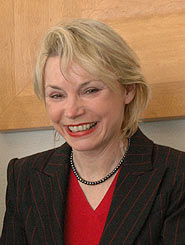Berkeleyan
Family-friendly policies for faculty are now 'an entitlement'
Newly approved package of work-life benefits likely to give UC a competitive edge among academic employers
![]()
| 13 April 2006
A comprehensive suite of "family-accommodation" policies for faculty, newly enshrined in the Academic Personnel Manual, places the University of California among the most "family-friendly" academic institutions in the nation.
| For information on newly approved policy changes, visit the UC Faculty Family-Friendly Edge website. Select "Revisions to UC Family-Friendly Policies" for UC President Dynes' memo summarizing the major policy changes; links at the bottom of that message go directly to relevant sections of the Academic Personnel Manual. An online newsletter, UC Families, serves faculty, staff, and students struggling to balance family life with work and/or study. Subscribers can learn about campus-specific family resources, post questions, and engage in online discussions. |
Enhancements to UC's family-accommodation policies, retroactive to Jan. 1, 2006, add a second semester of teaching relief for birth mothers on the Berkeley faculty (or a second quarter for faculty at campuses on the quarter system), and unprecedented part-time options for tenured and tenure-track faculty with significant family caregiving responsibilities. The new language, moreover, frames family accommodation as an entitlement "fundamental to an equitable and productive academic environment," to quote UC President Robert Dynes' Feb. 8 memo to UC chancellors and lab directors.
"These historic initiatives are the products of three years of intense internal study and discussions by administrators and faculty throughout the University of California," says Graduate Dean Mary Ann Mason, a key advocate for the changes and co-PI of the Family-Friendly Edge research, along with Angelica Stacy, associate vice provost for faculty equity. "Our generous package of family-accommodation policies for ladder-rank faculty is unparalleled among universities in the U.S., offering an exemplary model for others to adopt or adapt."
Policies related to childbearing and childrearing (including childbearing leave, parental leave, active service-modified duties, part-time work to accommodate family responsibilities, stopping the tenure clock, and personnel-review procedures) have been brought together in one section (APM 760). Further, the language now stipulates that a faculty member "is eligible for" (rather than "may request") family accommodations. That's an important change, says Marc Goulden, a member of the UC Faculty Family-Friendly Edge team. The researchers found that, with the former wording, mothers were afraid to make the request for fear that, as a result, they would not be taken seriously.
Losing the best and brightest
The new family-friendly policies represent a long-term effort by campus researchers to address issues of work-life balance in academia and keep talented women scholars in the academic "pipeline." According to Dean Mason: "We were losing our best and brightest women graduate students. They could not see how they could balance a faculty life, particularly in the pre-tenure years, with a new family. Our 'Do Babies Matter?' research project found that women Ph.D.s with children were often dropping out of the job market, or into part-time positions."
 Graduate-school dean Mary Ann Mason is a longtime researcher into family issues among academics.(Peg Skorpinski) |
According to Goulden, the part-time provisions may be the most significant of the newly instituted changes. "We've had this kind of lock-step profession," he says. "People get their Ph.D.s, try to land a postdoc or tenure-track job, work full-time (as in 60 or more hours a week) until tenure, and then keep moving, still working huge hours even after tenure." The new provisions are "a first step in putting in the profession the possibility of temporary slowdowns."
Taken as a whole, the family-friendly policies, though embedded in the bureaucratic language of the APM, are a huge step forward on the national scene. "If you put together the whole policy package," Goulden says, "UC now has the most comprehensive family-accommodation policy package for faculty in the country. It has everything - active-service-modified duties, tenure-clock extension, paid and unpaid leaves, and part-time options - and is generous in all these options."
The practical impact of policy changes
According to Stacy, "The policy changes position UC well for the approaching hiring boom, as aging faculty prepare to retire in large numbers and campuses prepare to replace those teachers and expand the ranks over the next decade." Who will take those jobs, achieve tenure, and shape future generations of students hangs in the balance: Women make up more than half of all U.S. Ph.D.s, under-represented minorities make up an increasing proportion of doctorates, and surveys show that both groups are keenly interested in family accommodations. In addition, as increasing numbers of male faculty become more actively involved in childrearing and/or elder care, "everyone stands to benefit," Stacy says.
Those at Berkeley and the UC Office of the President who have helped institute the family-friendly-policy package believe the shift at UC will inevitably have a positive impact on academia as a whole. "UC's new policies." says Mason, "are helping to frame the national movement toward creating a family-friendly climate." Not only are comparable institutions moving to match UC policies, she says, but talented scholars can now choose to stay in academia (rather than drop out for family reasons), and UC-trained Ph.D.s will demand comparable family-accommodation policies from other institutions.
Representatives from nine major research universities met at Berkeley last May to compare family-friendly policies and to work toward future improvements. "While considerable progress has been made," their presidents said in a joint statement, "we acknowledge that there are still significant steps to be taken toward making academic careers compatible with family caregiving responsibilities."
Now that key policies are at last in place, "the big ones we're chewing on," says Goulden, are department-level culture change (to make sure that the new policies are disseminated and implemented), expanded childcare options, benefits for faculty and staff who adopt, and relocation assistance for out-of-area hires.

